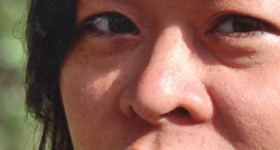As a Chinese American dual citizen of New Zealand and the United States, I take (perhaps undue) possessive pride in "kiwi" cultural exports. The Lord of the Rings trilogy, manuka honey, Flight of the Conchords, sauvignon blanc, Anna Paquin; all New Zealand specialties I feel I understand and appreciate much more than the average American Joe. Therefore, I had high hopes for Kawa, an official selection of this year’s San Francisco International LGBT Film Festival (Frameline Film Festival).
But I must admit, for all its noble intentions, the film left a lot to be desired. Directed by Katie Wolfe, with the original story based on a novel by Witi Ihimaera -- also the writer of Whale Rider -- the movie centers on the handsome title character, a modern Maori man named Kawariki (Calvin Tuteao). From the outside, it appears Kawa is on course to live happily ever after: he has a secure job in a flashy corner office, a big house, a nice car, and a loving wife with two happy kids. However, this king of the castle harbors a secret that threatens to make the whole kingdom come crashing down. Yup, you guessed it: he’s gay.
Feeling boxed in by a lifetime spent repressing this truth, Kawa has estranged himself without explanation to “protect his family” from the part of himself he can no longer ignore. Cue the dull backbeats of lounge music and fuzzy city streetlights that allude to his “dirty secret,” as we watch Kawa step into a shadowy steam room to engage in anonymous sex, and later meet up with his admiring younger lover. These scenes are veiled in implication and silhouettes, with a general feeling of uneasiness and discomfort. It seems Kawa, as well as the camera’s gaze, are hesitant to reveal this side of his life.
Far more convincing, are the images of cultural and family life, singing Maori songs in the car as they drive up the gorgeous New Zealand coast to play cricket on the beach and share hearty family meals. Certainly the most electrifying scene occurs when Kawa leads the men of his family in a traditional haka -- a warrior dance. With piercing eyes and outstretched limbs and tongues, it’s an intimidating show of masculine fortitude, further masking and burying that deeper truth.
Like in many other cultures, to be gay and Maori are incompatible identities, which Kawa struggles to reconcile. Instead, he switches back and forth between the two, alienating those involved on either side. No longer can he have his cake, and eat it, too.
Some scenes of family tension disappointingly dip into melodramatics and schmaltzy apologies. Other confessional moments are witnessed indirectly through wide-angle shots of people in conversation, or emotive nonverbal glances, which perhaps is more accurate among families who acknowledge conflict and truth without ever discussing them outright.
The film gets caught up in trying to present an “everyman” coming out story, when it would have been much stronger focusing on the subtle nuances and specifics of homosexuality and repression in Maori culture. Plus, by all accounts and supported by the cut of his shirts and the swanky home décor, Kawa lives a thoroughly modern life. So how do his children view homosexuality, and do they come to accept him? Where are the other gay Maoris in the community? Will his wife come to sympathize with him, or forever only feel the blush of his betrayal and lies? If only the film had spent more time exploring how the family will adapt and change with this new reality.
Kawa is most successful as it digs into the taproot of conflict, that is, Kawa’s impossible task of fulfilling familial expectations and responsibilities, while being wholly true to himself. The film is powerful in sketching out the fine line between selfishness and sacrifice when it comes to love, family, culture, and true happiness.
Kawa screens at the Frameline Film Fesitval on Tuesday, June 21, 4:00 pm at the Castro Theatre and on Thursday, June 23, 9:30 pm at Rialto Cinemas Elmwood (Berkeley).
Nicole Wong is a contributing editor at Hyphen, and proud to be a kiwi.
Film Review: Katie Wolfe's 'Kawa'
Contributor:
Nicole Wong
Senior Editor
Nicole Wong is a senior editor for Hyphen living in San Francisco. By day, she's a media engagement strategist at Active Voice, tackling social issues through the creative use of film.










Comments